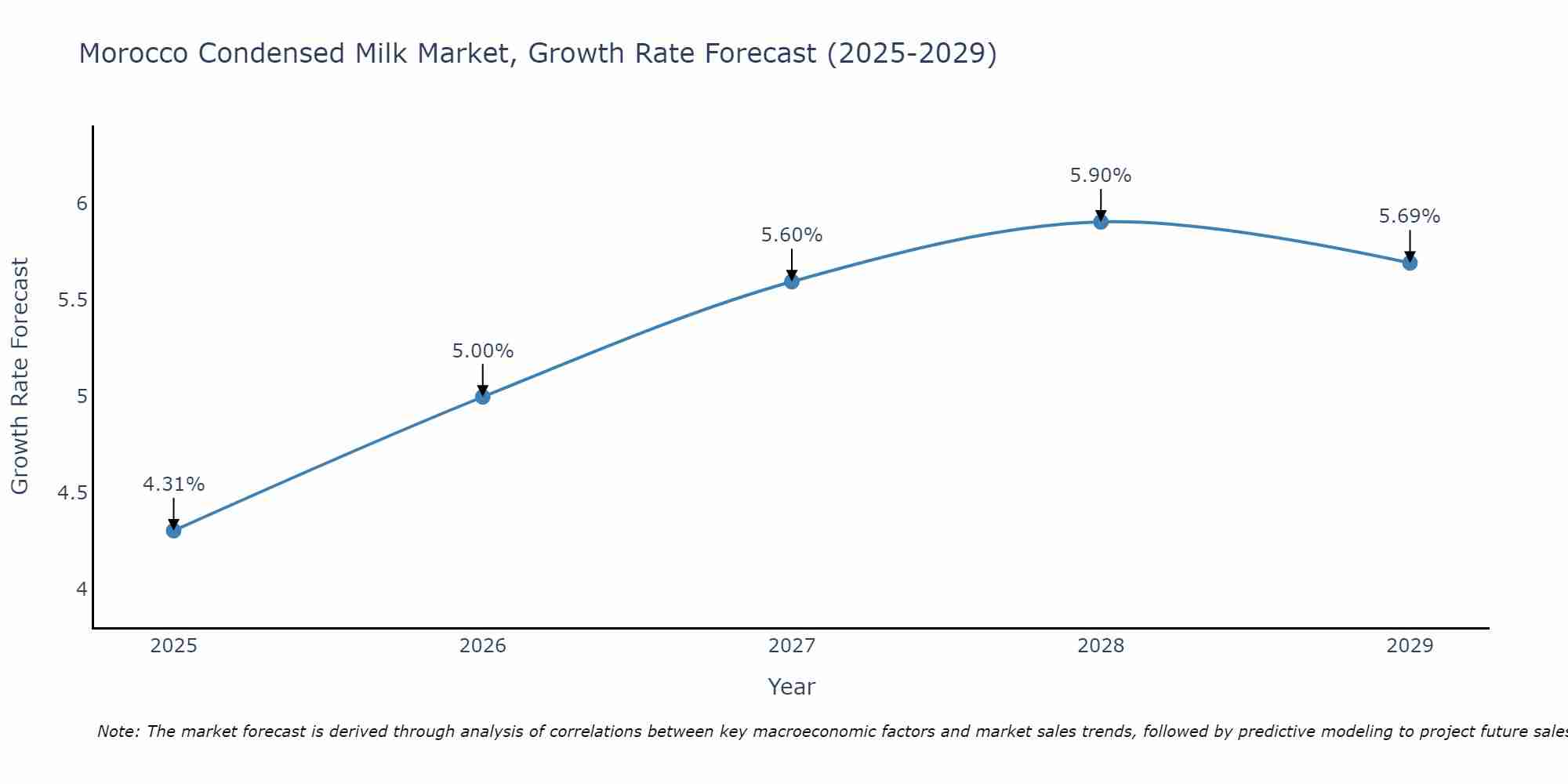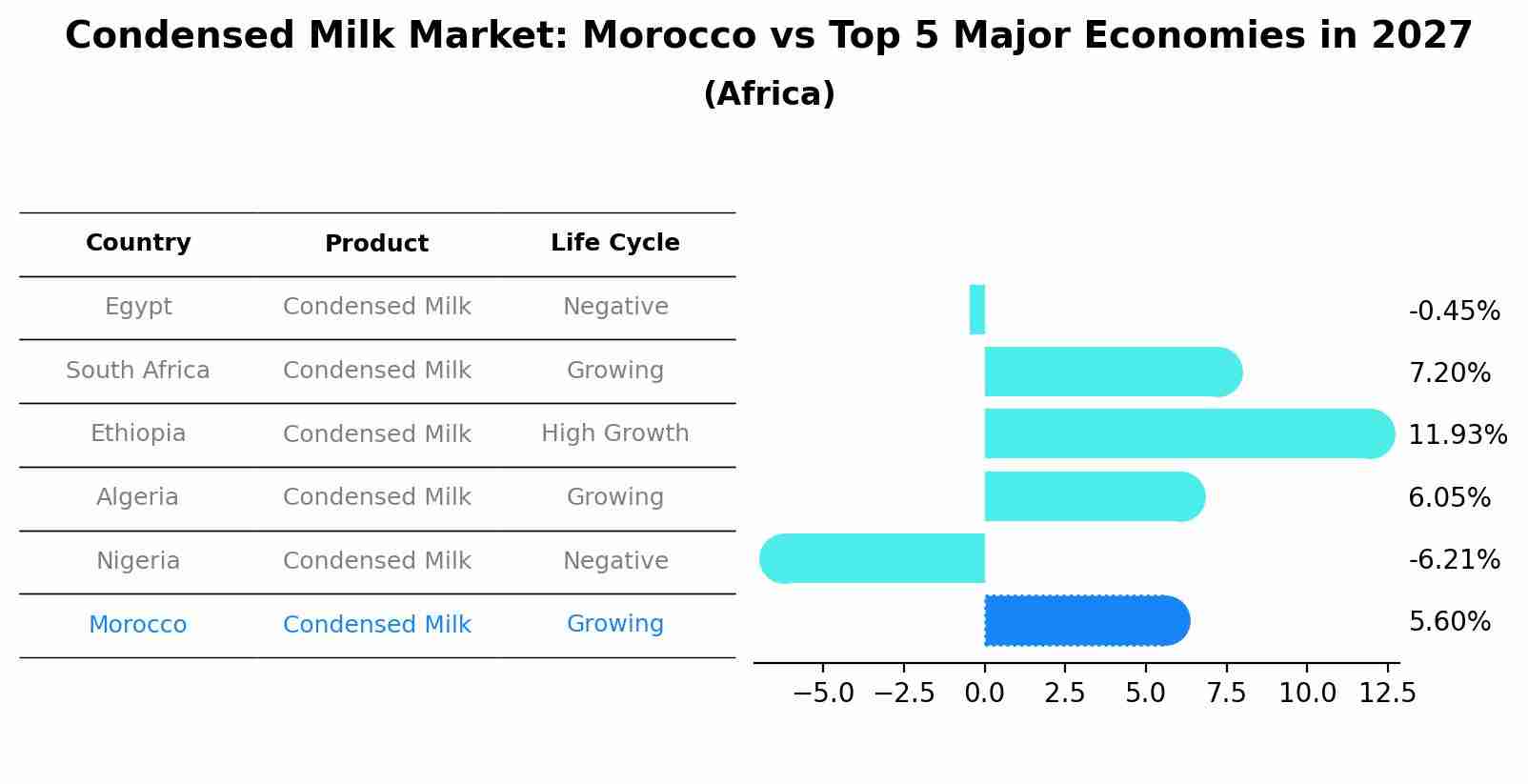Morocco Condensed Milk Market (2025-2031) Outlook | Forecast, Revenue, Companies, Size, Share, Value, Analysis, Trends, Industry & Growth
| Product Code: ETC381113 | Publication Date: Aug 2022 | Updated Date: Apr 2025 | Product Type: Market Research Report | |
| Publisher: 6Wresearch | Author: Shubham Padhi | No. of Pages: 75 | No. of Figures: 35 | No. of Tables: 20 |
Morocco Condensed Milk Market Size Growth Rate
The Morocco Condensed Milk Market is projected to witness mixed growth rate patterns during 2025 to 2029. Growth accelerates to 5.90% in 2028, following an initial rate of 4.31%, before easing to 5.69% at the end of the period.

Condensed Milk Market: Morocco vs Top 5 Major Economies in 2027 (Africa)
The Condensed Milk market in Morocco is projected to grow at a growing growth rate of 5.60% by 2027, highlighting the country's increasing focus on advanced technologies within the Africa region, where Egypt holds the dominant position, followed closely by South Africa, Ethiopia, Algeria and Nigeria, shaping overall regional demand.

Morocco Condensed Milk Market Synopsis
In Morocco, the condensed milk market has been steadily growing, driven by increasing consumer demand for convenient and long-lasting dairy products. With its versatility and shelf stability, condensed milk has found its way into various culinary traditions across the country, from traditional desserts to modern beverages. Local dairy producers have been expanding their product offerings to cater to this demand, while also exploring new distribution channels to reach a wider audience.
Drivers of the market
The Morocco condensed milk market is driven primarily by increasing consumer preference for convenient and long-lasting dairy products. Urbanization and the rise of middle-class incomes have boosted demand for ready-to-use ingredients, which are crucial in traditional and modern recipes. Additionally, the expanding food processing industry, which utilizes condensed milk in a variety of products such as desserts, sweets, and beverages, further fuels market growth. Improved distribution networks and the introduction of new flavors and fortified products also contribute to the market`s expansion.
Challenges of the market
The condensed milk market in Morocco faces challenges due to fluctuating milk prices, which impact production costs. Additionally, the market may struggle with consumer preferences shifting towards healthier alternatives and concerns about the nutritional value of condensed milk.
Government Policy of the market
The Morocco government has implemented policies aimed at promoting domestic production and ensuring food security. These policies often involve providing support to the dairy industry, including the condensed milk sector. Government initiatives may include subsidies for dairy farmers, investments in infrastructure, and regulations to maintain quality standards. Additionally, trade agreements with neighboring countries and international partners may influence the import and export dynamics of condensed milk in Morocco.
Key Highlights of the Report:
- Morocco Condensed Milk Market Outlook
- Market Size of Morocco Condensed Milk Market, 2024
- Forecast of Morocco Condensed Milk Market, 2031
- Historical Data and Forecast of Morocco Condensed Milk Revenues & Volume for the Period 2021-2031
- Morocco Condensed Milk Market Trend Evolution
- Morocco Condensed Milk Market Drivers and Challenges
- Morocco Condensed Milk Price Trends
- Morocco Condensed Milk Porter's Five Forces
- Morocco Condensed Milk Industry Life Cycle
- Historical Data and Forecast of Morocco Condensed Milk Market Revenues & Volume By Product Type for the Period 2021-2031
- Historical Data and Forecast of Morocco Condensed Milk Market Revenues & Volume By Dairy for the Period 2021-2031
- Historical Data and Forecast of Morocco Condensed Milk Market Revenues & Volume By Non-Dairy for the Period 2021-2031
- Historical Data and Forecast of Morocco Condensed Milk Market Revenues & Volume By Packaging Type for the Period 2021-2031
- Historical Data and Forecast of Morocco Condensed Milk Market Revenues & Volume By Cans for the Period 2021-2031
- Historical Data and Forecast of Morocco Condensed Milk Market Revenues & Volume By Tubes for the Period 2021-2031
- Historical Data and Forecast of Morocco Condensed Milk Market Revenues & Volume By Bottles for the Period 2021-2031
- Historical Data and Forecast of Morocco Condensed Milk Market Revenues & Volume By Distribution Channel for the Period 2021-2031
- Historical Data and Forecast of Morocco Condensed Milk Market Revenues & Volume By Supermarkets and Hypermarkets for the Period 2021-2031
- Historical Data and Forecast of Morocco Condensed Milk Market Revenues & Volume By Convenience Stores for the Period 2021-2031
- Historical Data and Forecast of Morocco Condensed Milk Market Revenues & Volume By Specialty Stores for the Period 2021-2031
- Historical Data and Forecast of Morocco Condensed Milk Market Revenues & Volume By Online Retails for the Period 2021-2031
- Historical Data and Forecast of Morocco Condensed Milk Market Revenues & Volume By Others for the Period 2021-2031
- Morocco Condensed Milk Import Export Trade Statistics
- Market Opportunity Assessment By Product Type
- Market Opportunity Assessment By Packaging Type
- Market Opportunity Assessment By Distribution Channel
- Morocco Condensed Milk Top Companies Market Share
- Morocco Condensed Milk Competitive Benchmarking By Technical and Operational Parameters
- Morocco Condensed Milk Company Profiles
- Morocco Condensed Milk Key Strategic Recommendations
Frequently Asked Questions About the Market Study (FAQs):
- Single User License$ 1,995
- Department License$ 2,400
- Site License$ 3,120
- Global License$ 3,795
Search
Thought Leadership and Analyst Meet
Our Clients
Related Reports
- Afghanistan Apparel Market (2026-2032) | Growth, Outlook, Industry, Segmentation, Forecast, Size, Companies, Trends, Value, Share, Analysis & Revenue
- Canada Oil and Gas Market (2026-2032) | Share, Segmentation, Value, Industry, Trends, Forecast, Analysis, Size & Revenue, Growth, Competitive Landscape, Outlook, Companies
- Germany Breakfast Food Market (2026-2032) | Industry, Share, Growth, Size, Companies, Value, Analysis, Revenue, Trends, Forecast & Outlook
- Australia Briquette Market (2025-2031) | Growth, Size, Revenue, Forecast, Analysis, Trends, Value, Share, Industry & Companies
- Vietnam System Integrator Market (2025-2031) | Size, Companies, Analysis, Industry, Value, Forecast, Growth, Trends, Revenue & Share
- ASEAN and Thailand Brain Health Supplements Market (2025-2031) | Strategy, Consumer Insights, Analysis, Investment Trends, Opportunities, Growth, Size, Share, Industry, Revenue, Segments, Value, Segmentation, Supply, Forecast, Restraints, Outlook, Competition, Drivers, Trends, Demand, Pricing Analysis, Competitive, Strategic Insights, Companies, Challenges
- ASEAN Bearings Market (2025-2031) | Strategy, Consumer Insights, Analysis, Investment Trends, Opportunities, Growth, Size, Share, Industry, Revenue, Segments, Value, Segmentation, Supply, Forecast, Restraints, Outlook, Competition, Drivers, Trends, Demand, Pricing Analysis, Competitive, Strategic Insights, Companies, Challenges
- Europe Flooring Market (2025-2031) | Outlook, Share, Industry, Trends, Forecast, Companies, Revenue, Size, Analysis, Growth & Value
- Saudi Arabia Manlift Market (2025-2031) | Outlook, Size, Growth, Trends, Companies, Industry, Revenue, Value, Share, Forecast & Analysis
- Uganda Excavator, Crane, and Wheel Loaders Market (2025-2031) | Strategy, Consumer Insights, Analysis, Investment Trends, Opportunities, Growth, Size, Share, Industry, Revenue, Segments, Value, Segmentation, Supply, Forecast, Restraints, Outlook, Competition, Drivers, Trends, Demand, Pricing Analysis, Competitive, Strategic Insights, Companies, Challenges
Industry Events and Analyst Meet
Whitepaper
- Middle East & Africa Commercial Security Market Click here to view more.
- Middle East & Africa Fire Safety Systems & Equipment Market Click here to view more.
- GCC Drone Market Click here to view more.
- Middle East Lighting Fixture Market Click here to view more.
- GCC Physical & Perimeter Security Market Click here to view more.
6WResearch In News
- Doha a strategic location for EV manufacturing hub: IPA Qatar
- Demand for luxury TVs surging in the GCC, says Samsung
- Empowering Growth: The Thriving Journey of Bangladesh’s Cable Industry
- Demand for luxury TVs surging in the GCC, says Samsung
- Video call with a traditional healer? Once unthinkable, it’s now common in South Africa
- Intelligent Buildings To Smooth GCC’s Path To Net Zero


















